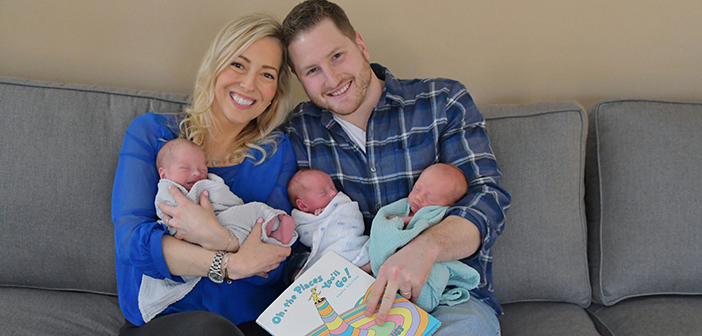Birth cohort study addresses child health problems from nutrition to COVID.
In Rhode Island, when pregnant women are ready to deliver their babies, 80 percent of them check in at Women & Infants Hospital. If kids need urgent care, parents can rush them to Hasbro Children’s Hospital, which handles 90 percent of pediatric hospitalizations in the state. Nearby, Bradley Hospital is devoted to child and adolescent mental health.
To build on the opportunity offered by that continuity of care, the Hassenfeld Child Health Innovation Institute at Brown commenced in 2017 an eponymous study of pregnant women and their babies over time. The Hassenfeld Study’s prenatal cohort gathers data from women in their first or second trimester and follows them until after delivery; the postnatal cohort focuses on women after delivery. Participants agree to share demographic information, provide saliva and blood samples, and complete regular surveys about their health.
More than 1,000 women have enrolled so far, and they’re yielding a treasure trove of data that enable researchers to look for patterns and make predictions about maternal and child health.
For example: what factors that affect pregnant women with asthma (such as stress, diet, sleep, and genetics) may predict the development of asthma in their children? What newborn behaviors may be related to developmental delays? Are babies born in a certain ZIP code more likely to experience a specific health issue?
“The Hassenfeld Study is a rich source of data that can be used to answer important questions as well as seed additional studies on pressing child health issues,” says Patrick Vivier ’85 MD’89 RES’92, PhD, a professor of health services, policy, and practice and of pediatrics who directs the institute. In 2019 alone, affiliated scholars won nearly $15 million in NIH grants for such studies. The data also have enabled the institute to help local partners solve a range of real-world problems.
When the Rhode Island Community Food Bank wanted to learn more about the people they served (a quarter of whom are children), institute researchers designed a survey, trained volunteers to administer it, and analyzed results. They learned that 45 percent of respondents had significant health-related issues.
“The 2019 hunger survey provided a much more detailed portrait of the families for whom our programs are structured,” says Andrew Schiff, CEO of the food bank. “It changed in a profound way our sense of responsibility for making sure we were providing the healthiest possible food to our patrons and also that we continue to collaborate with health care providers.”
In a survey last year, 70 percent of mothers enrolled in the Hassenfeld Study reported higher stress levels compared to before the pandemic, while 19 percent of children had missed in-person doctor’s appointments. Based on these findings, the institute offered webinars on topics like wellneSs routines for kids during COVID. The study data shouldn’t only be useful to research partners, Vivier says: “We try to make this information available as soon as possible to advise, reassure, and guide families across the state— and beyond.”




